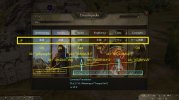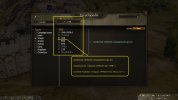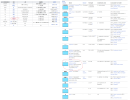The other person briefly pointed out the mistranslation once on his 2022.2.2, 17 months ago.
However, it seems that TW's Japanese advisor did not understand the meaning.
So, this time, I will write down a reliable explanation below.
Also, depending on how the translation is applied, I think that there are parts that are mistranslated and parts that can be left as they are, but it is a definite mistranslation.
While playing for 2 years, I checked if it was a mistranslation, but I can assure you that it is definitely a mistake.
In order to play the current MOUNT & BLADE II: BANNERLORD Japanese version, it is a prerequisite to use a translation MOD.
Or you can learn the rules by posting on external game sites.
The reason is that the fatal mistranslation is not corrected, so the game system is misunderstood.
Translation Error:
<string id="5k4dxUEJ" text="中隊" /> MultiPlayer\std_TaleWorlds_MountAndBlade_Multiplayer_ViewModelCollection_jpn.xml
<string id="zPYRGJtD" text="中隊" /> SandBox\std_TaleWorlds_CampaignSystem_jpn.xml
Corrected Translation:
<string id="5k4dxUEJ" text="兵士ユニット" />
<string id="zPYRGJtD" text=" 兵士ユニット" /> A single-byte space is required at the beginning of the word.
Where did you find this error (which conversation, screen, area,...)?: Encyclopedia
Screenshot:


However, it seems that TW's Japanese advisor did not understand the meaning.
So, this time, I will write down a reliable explanation below.
Also, depending on how the translation is applied, I think that there are parts that are mistranslated and parts that can be left as they are, but it is a definite mistranslation.
While playing for 2 years, I checked if it was a mistranslation, but I can assure you that it is definitely a mistake.
In order to play the current MOUNT & BLADE II: BANNERLORD Japanese version, it is a prerequisite to use a translation MOD.
Or you can learn the rules by posting on external game sites.
The reason is that the fatal mistranslation is not corrected, so the game system is misunderstood.
Translation Error:
<string id="5k4dxUEJ" text="中隊" /> MultiPlayer\std_TaleWorlds_MountAndBlade_Multiplayer_ViewModelCollection_jpn.xml
<string id="zPYRGJtD" text="中隊" /> SandBox\std_TaleWorlds_CampaignSystem_jpn.xml
Corrected Translation:
<string id="5k4dxUEJ" text="兵士ユニット" />
<string id="zPYRGJtD" text=" 兵士ユニット" /> A single-byte space is required at the beginning of the word.
Where did you find this error (which conversation, screen, area,...)?: Encyclopedia
Screenshot:


Last edited:









